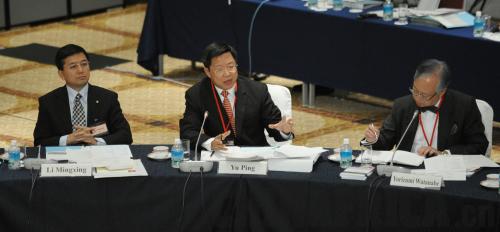|
 |
|
TRADE TALK:The Second Asian Business Summit, Tokyo (XINHUA) |
With the rise of emerging countries represented by China and some other countries, the current international trade system is embracing a reform. A prominent feature of this reform is the participation of an increasing number of countries and regions.
It is noteworthy that the repeated setbacks in the Doha Round talks are a reflection of the difficulties of the reform. The Doha Round, which World Trade Organization (WTO) members started in November 2001 with the aim of lowering trade barriers around the world, has not been completed yet. The talks also exposed the problems of the current international trade system.
Problems
The current international trade system was established within the frameworks of the General Agreement on Tariffs and Trade and its successor, the WTO. It has served as a significant pillar for the sustained and stable growth of the world economy after World War II. Also, it has greatly promoted economic globalization and trade liberalization. Thanks to its orderly operation over the past decades, the overall environment of international trade has been dramatically improved. The size of the world economy, as well as international trade volume, has grown exponentially.
However, now this system has numerous problems. A major problem is the conflict between developed countries and developing countries. Developed countries control the decision-making system and the setting of standards, while developing countries are in a subordinate position. The pattern has created a big difference in the power exercised by the two camps.
Traditional sensitive issues pose another problem. On the one hand, developed countries won't stop offering export subsidies to their own agricultural products. But on the other hand, they force developing countries to open up markets. This has caused dissatisfaction among developing countries. These issues not only put WTO members' economic interests at stake, but may also affect their security and stability. However, they have never been solved.
Burgeoning regional trade cooperation also calls for reform in the international trade system.
In addition, the current trade system has not successfully curbed trade protectionism. Protectionism practiced by a number of countries and regions has hindered the progress of the reform.
|